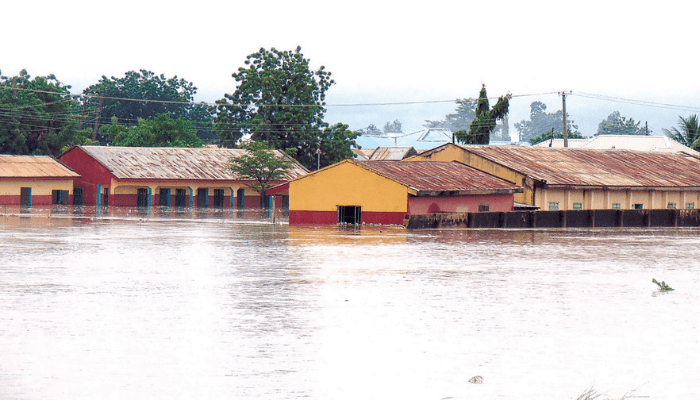By Ladi Patrick-Okwoli
Nigeria could face more devastating flooding, as governments at federal and state levels consistently fail to respond to scientific forecasts and climate risks, experts warn.
They say despite repeated warnings from hydrological and climate specialists, proactive measures remain inadequate, putting millions of Nigerians in harm’s way.
Clement Nze, former director- general of the Nigeria Hydrological Services Agency (NIHSA), raised the alarm on the country’s flood vulnerability.
In an exclusive interview with BusinessDay, Nze lamented the persistent disregard of annual flood risk forecasts issued to government authorities across the nation.
“The problem is not in the prediction; it is the non-response and lack of proactive measures,” he stated, stressing that over 7,000 communities have already been identified as flood- or drought-prone this year.
Read also: Top 5 states projected to experience floods in 2025
He called for the institutionalisation of annual environmental audits to identify and map flood-prone zones by studying physical markers left by past floods.
“Illegal construction on floodplains and natural waterways continues unabated, forcing floodwaters into residential and commercial areas,” he warned, referencing recent catastrophic floods in Mokwa, Onitsha and Kaduna that could have been mitigated had state governments enforced existing regulations.
He criticised politicians who only engage flood-affected communities during election campaigns and urged states to utilise ecological funds allocated for disaster management.
Nze also called for the reform of the Presidential Committee on Flood Relief and Rehabilitationin order to shift its focus from reactive relief to proactive mitigation.
“Government is the most powerful institution in any society. It must muster the will to protect lives, not just count the dead.”
Complementing the former director-general’s views, Agbo Chinonso, senior climate and policy expert at Batnon Center for Environment and Sustainable Development, described Nigeria’s flooding crisis as a symptom of systemic collapse rather than a purely natural event.
“Flooding is not just natural; it is a result of system collapse. Unless Nigeria adopts a whole-of-society approach to climate resilience, we will keep seeing preventable disasters,” Chinonso stressed.
He explained that while forecasts predict increased rainfall, flooding results largely from deforestation, clogged rivers, poor drainage infrastructure and weak environmental enforcement.
Highlighting rapid forest loss in Cross River, Ondo and Northern Nigeria, Chinonso warned that tree-planting programmes are failing to keep pace with illegal logging and desertification.
“Our infrastructure is collapsing under climate pressure. Roads fall apart within years because climate risks are not factored into design or maintenance,” he noted.
Read also: Mokwa floods: Residents recount losses as UNICEF, govt offer funds, relief materials to victims
He called for a coordinated national strategy to enhance adaptive capacity and integrate climate resilience across sectors, from agriculture to health and energy.
Adding a strategic perspective, Akugbe Iyamu, president of the Environment Protection and Climate Change Practitioners, pointed to a fundamental lack of sincerity and political will as the root causes of recurrent flood disasters.
“Every year, despite the warnings, we keep having flooding because sincerity is missing in government’s preparations and responses,” Iyamu, an air vice marshal (rtd), said.
He urged government at all levels to activate ecological funds meant for disaster management and fix broken local governance systems, which he described as the frontline in addressing such crises.
Iyamu also stressed the need for Nigeria to learn from other countries’ climate response and take bold steps such as massive tree-planting initiatives, highlighting Saudi Arabia’s pledge to plant 100 billion trees as a model.
“You cannot solve any problem without data. What data are the authorities using? The ones we hear about don’t seem to translate into action,” he noted, pointing out that funds from the World Bank meant for flood preparation are not effectively used in vulnerable areas.
The convergence of expert opinions paints a grim picture for Nigeria’s 2025 rainy season.
Despite clear scientific forecasts from agencies like NIHSA and the Nigerian Meteorological Agency (NIMET), the lack of coordinated, well-funded and sincere governmental action continues to undermine efforts to prevent disasters.
In 2024, a flood in September killed 230 people in Borno State and displaced over 600,000 residents. In 2022, severe flooding across the country impacted 34 out of the 36 states, killed hundreds and displaced more than 1.3 million.
Read also: NEMA sends officials to 15 states to warn people about coming floods
A recent report from the World Meteorological Organization (WMO) said the worsening severity is related to climate change and increasing surface and water temperatures, all of which is taking a high toll throughout the African continent.
In Nigeria, warning signs are everywhere. NIMET has predicted heavy rainfall and potential flooding in 33 states this year.
